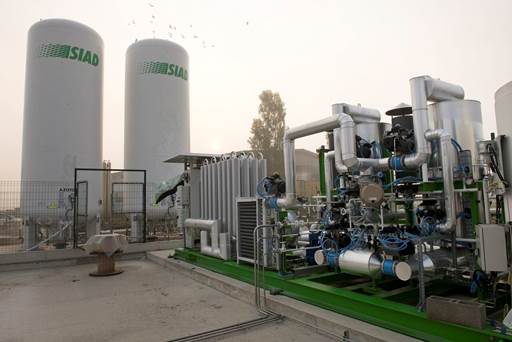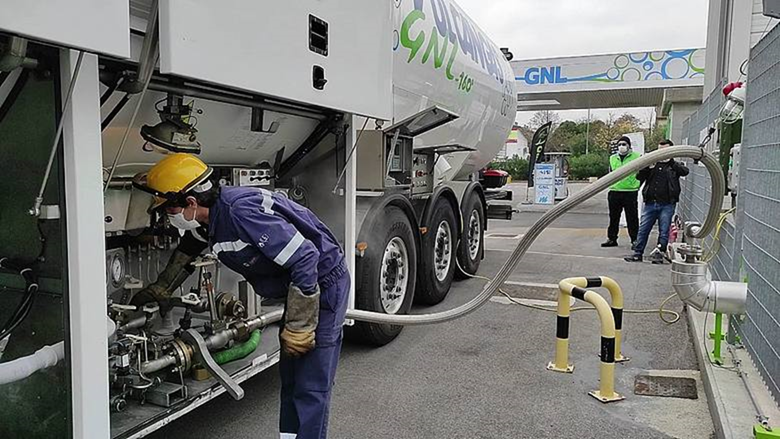
After the first ship-to-ship refuelling in recent days, the start of work at the OLT regasification plant to supply the tankers, the first service station in Sicily, the start of the methanization of Sardinia, the many innovations in the development of direct LNG uses in Italy are joined by two other milestones: the first production of bio LNG and the first refuelling of a truck.
The first truck refuelling operation took place on Thursday 5 November at the Vulcangas service station in Rimini, which has been operating with LNG since 2015, thanks to the start, a few days earlier, of the industrial production of bioLNG at the Lucra96 biogas liquefaction plant in Lodi, Lombardy.
The initiative, in which the Italian Biogas Consortium (CIB) actively collaborated in all phases, was carried out in several stages: first refuelling of a tanker truck in Lodi, transfer to the service station, transfer of bioLNG to the plant tank and delivery of bioLNG, carried out in 6-7 minutes, to an Iveco S-Way Natural Power truck, "natural force mode".
An online conference was also held on the occasion, with live streaming of supplies, organised by the CIB, with the presence of the Rimini City Environmental Councillor and all the actors involved; ConferenzaGNL was also present. During the event, the all-Italian authorship of the vehicles, tankers and trucks, as well as the technologies used, was highlighted.
The Lucra96 plant, specialised in the production of biogas from livestock waste, is the result of collaboration between SIAD Group companies: Tecno Project Industriale developed the upgrading unit for the transformation of biogas into LNG using liquid nitrogen technology, SIAD Macchine Impianti designed and produced the liquefier and SIAD SpA supplied the nitrogen.
The new series of Iveco S-Way NP LNG vehicles, which in the same days received the coveted "Truck of the Year" award, now offers the same technical and comfort performance for drivers as the corresponding traditional fuel-powered vehicles, with an additional 1,600 km of reduced noise, vibration and range.
It is no coincidence that, at the beginning of October, Iveco and Vulcangas signed a collaboration agreement for the promotion and diffusion of LNG and bioLNG, with the launch of a special fuel card, aimed at all those who purchase an Iveco S-Way NP and refuel at Vulcangas stations, which provides a discount proportional to the km travelled, up to a maximum of 5,000 euros that can be spent in 18 months.
Compared to traditional fuels, the vehicle, supported by the 460 hp Cursor 13 engine with two 540 lt tanks, reduces nitrogen dioxide emissions by 90%, particulate matter by 95% and CO2 emissions by less than 10% with the use of BioLNG.
Also present at the event was the company Rattini Angelo based in Sant'Arcangelo di Romagna, which purchased 20 Iveco S-Way NP and supplied the vehicle for the first refuelling. Rattini specialises in the transport of fresh meat and, given that bioLNG is also produced with the waste from the industrial processing of the food it transports itself, a virtuous model of circular economy is created, as noted by the specialist magazine "Uomini e Traporti".
Last September, the SIAD Group's Tecno Project Industriale also acquired an important stake in 2LNG, a HOLDIM Group company involved in the construction of liquefactors, strengthening the partnership already in place and expanding the offer to the biogas treatment chain. At the heart of the business are the LNGPocket liquefaction systems, which are fully automated and can be managed remotely.
Piero Gattoni, president of the CIB, referring to the first supply of bioLNG, pointed out in a note that "the widespread diffusion of liquefied biomethane in transport throughout Italy, opens the way to achieving the European environmental targets set for 2030. There are already 20 projects under construction or already authorised or in the process of being authorised for the production of bioLNG, with a production capacity of 4 to 27 tonnes per day, making it possible to decarbonise the journeys of the over 3,000 LNG trucks currently circulating in our country", he added.
Source: ConferenzaGNL
 EN
EN  it
it


